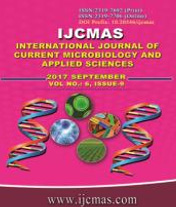


 National Academy of Agricultural Sciences (NAAS)
National Academy of Agricultural Sciences (NAAS)

|
PRINT ISSN : 2319-7692
Online ISSN : 2319-7706 Issues : 12 per year Publisher : Excellent Publishers Email : editorijcmas@gmail.com / submit@ijcmas.com Editor-in-chief: Dr.M.Prakash Index Copernicus ICV 2018: 95.39 NAAS RATING 2020: 5.38 |
Conventional tillage practices may adversely affect long-term soil productivity due to erosion and loss of organic matter in soils. Sustainable soil management can be practiced through conservation tillage (including no-tillage), high crop residue return, and crop rotation. Microorganisms in the soil strongly influence soil processes fulfill key roles in the decomposition of organic matter, Therefore, the constituents of soil microorganisms, such as microbial and microbial community diversity, have often been identified as sensitive indicators of biological indices for maintaining soil health and quality. Conservational agriculture system showed significantly higher total bacterial count in rhizospheric soil of main kharif crop viz. paddy, maize and soybean over conventional agriculture system. Conservational agriculture system proved to be superior over conventional agriculture system. Microbial activity as bacteria, actinomycetes fungi were highest at reproductive stage in both conventional and conservational agriculture system in soybean crop.
 |
 |
 |
 |
 |